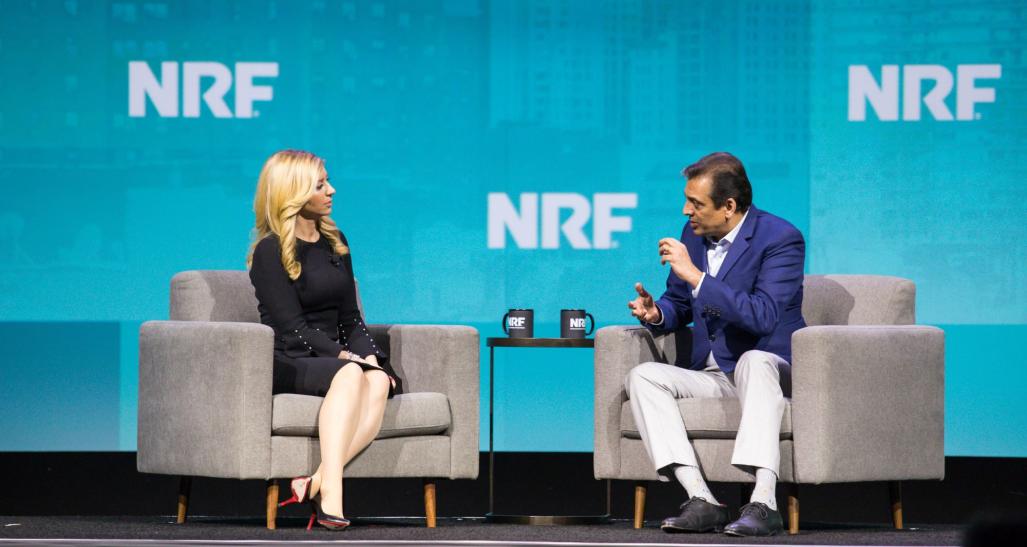
Sara Eisen, “Closing Bell” co-anchor at CNBC, speaks with Raj Subramaniam, president and CEO of FedEx Corporation, at NRF 2024: Retail's Big Show.
In a presentation at NRF 2024: Retail’s Big Show, FedEx CEO and President Raj Subramaniam explained his company’s strategy and its expanding role in the present and future of consumer/vendor relations. He was joined onstage by Sara Eisen, co-anchor of “Closing Bell” on CNBC.
Subramaniam began with some arithmetic. Online retail sales are expected to reach an annual total of $8 trillion by 2026, he said, a sum that will be laid out by the world’s 4 billion consumers.
“You’re all here because you want to take a larger share of that $8 trillion,” he said. “You want to reach those 4 billion consumers and turn them into loyal customers. And you want to optimize your supply chain end-to-end and deliver a better, seamless ecommerce experience.”
FedEx was founded on the belief that innovation can solve problems, Subramaniam said. “Fifty years ago, we didn’t just start a company. We launched an industry. We built the network that connects this world. And when you deliver millions of packages in 220 countries and territories every day, you gain knowledge about the global supply chain.”
Browse photos, blog posts, videos and more from NRF 2024: Retail’s Big Show.
Insights become intelligence
“I fundamentally believe that this is a pivotal time for ecommerce,” Subramaniam said, “as we combine the power of AI and machine learning with the capabilities of our physical network to create end-to-end digital solutions and an unparalleled experience for you and your customers. To put it simply, our mission is to make supply chains smarter for everyone.”
Over the last few years, he said, upheavals in global supply tools have reshaped retail and the tools that retailers need to be competitive, efficient and resilient.
“Physical networks get us where we need to be, but digital supply chains make that journey faster, more precise and — equally critical — more seamless. And that’s what consumers expect in this time of anytime, anywhere commerce,” Subramaniam said.
“Today, our role in shopping is more than shipping. It’s also demand. It’s conversion. Fulfillment. Visibility. And, of course, returns. Currently, companies must rely on several separate solutions to manage all aspects of their ecommerce business.” This siloed approach, he noted, is costly, inefficient and causes a disjointed customer experience — making it difficult to differentiate and scale in market.
From benefit to expectation
In the middle of the customer journey, transparency is critical. Real-time tracking is no longer a benefit, Subramaniam said: It has become an expectation. According to FedEx’s figures, 94% of consumers expect companies to inform them about delays before they have to ask. And, he noted, “Many shoppers are willing to accept a delayed delivery, if they are informed about it before the final delivery date.”
FedEx combines package information with learned patterns from across its network to predict shipment success. “Companies can use this information to notify customers of at-risk shipments right away,” he said, “so they can make informed decisions and communicate alternative options.”
Options are also essential when it comes to returns, he said: 96% of consumers would shop again with a brand that has an easy returns policy. “A streamlined returns experience empowers customers to purchase more with lower risk and ensures inventory is back on the shelf quickly and efficiently.”
Having described a need — or a series of needs — facing the entire direct-to-consumer-based retail industry, Subramaniam announced fdx, which he described as the first data-driven commerce platform that connects the entire customer journey, making it easier for companies to grow demand, increase conversion, optimize fulfillment and streamline returns.
The official launch of fdx is planned for the fall of this year; it is currently available as a private preview.


